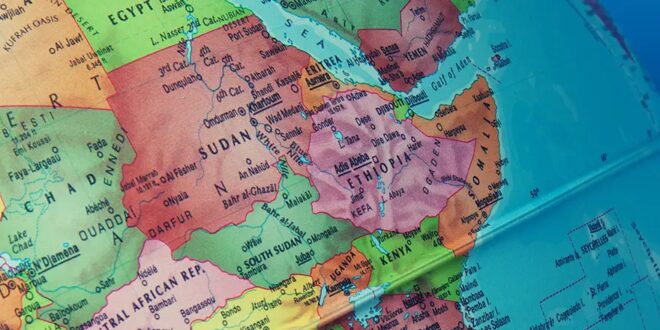This paper provides background on recent UK policy towards East Africa, summarises the research findings for RUSI’s project ‘Furthering Global Britain? Reviewing the Foreign Policy Effect of UK Engagement in East Africa’ and offers recommendations for the UK government with relevance both to the region and to an integrated foreign policy globally.
Since 2016, successive British governments have sought to emphasise that a post-Brexit UK would be outward looking, collaborative and influential. A series of speeches and policy statements stressed that the UK would pursue future prosperity through overseas engagements built upon investments in diplomacy, trade, defence and development aid. In March 2021, the UK government published its Integrated Review of Security, Defence, Development and Foreign Policy, reiterating these themes and referencing Eastern Africa as a part of the world where the UK would increase its engagement, with explicit references to Kenya, Ethiopia, Somalia and Sudan.
A RUSI research project, ‘Furthering Global Britain? Reviewing the Foreign Policy Effect of UK Engagement in East Africa’, has examined whether, and how, the UK has leveraged international development, defence and diplomatic investments as envisaged. For the four above-mentioned countries, the project analysed the UK’s core engagements from 2015 to 2022. Through key informant interviews and literature analysis, it identified factors that helped or hindered the UK in pursuing an integrated and collaborative foreign policy approach, and tested perceptions of the UK. The effects of major structural changes to UK foreign policy since 2015 were also studied, notably reducing the overseas aid budget, merging two ministries to create the new Foreign, Commonwealth & Development Office (FCDO), and leaving the EU.
This paper provides background on recent UK policy towards the region, summarising the project’s research findings, and offers recommendations for the UK government with relevance both to the region and to an integrated foreign policy globally. The key findings are as follows:
In the face of volatility, the UK has had to adapt its approach towards the region numerous times since 2015. Actions include reallocating funding towards drought relief, suspending cooperation during conflict and political upheaval (Sudan), condemning reported war crimes (Ethiopia), bolstering stabilisation efforts in the wake of new military offensives (Somalia) and providing support to mitigate electoral instability (Kenya and Somalia).
Despite inconsistent levels of political leadership, the UK contributed to relatively successful outcomes across the four case study countries. However, these are not sufficient (or necessarily sustainable) in isolation and continue to face important constraints and challenges.
Attempts by UK officials to better integrate defence, international development and diplomatic work have made progress.
While the abolition of the UK Department for International Development (DFID) is regretted by some UK regional partners, the unplanned creation of the FCDO shows early promise.
The UK retains a good reputation in the region for the calibre of its diplomats and development and defence experts, and has broadly maintained staffing levels in the region, despite budget cuts.
The UK is reasonably well regarded as a development, defence and diplomatic actor across the region. However, despite this, a range of middle and great powers increasingly offer alternative forms of support to East African governments, which contributes to perceptions of declining UK influence.
The UK has established relationships and partnerships with a variety of actors. It often operates effectively through ad hoc groupings of bilateral and multilateral networks in the region and globally, bolstered by envoys and technical specialists.
Between 2019 and 2021, the UK bilateral aid budget was reduced by around 50% across the region. External relationships suffered, as funding decisions were arrived at iteratively and were not always well communicated.
Brexit did not significantly impair the UK’s operational effectiveness in the region, but alongside other factors it probably contributed to a perception of declining influence.
UK strategies at the country level were sometimes unclear, overly broad or outpaced by contextual changes. The lack of a regional strategy also remains a significant gap, given the transnational nature of the opportunities and challenges facing Eastern Africa.The research raises important questions concerning the nature of UK–Africa relations and the role of aid, development and defence engagement within an integrated foreign policy. Various recommendations are offered in this paper, spanning operational and strategic levels. These include building on lessons from the DFID–Foreign & Commonwealth Office merger to ensure the FCDO’s capabilities fully support integrated ways of working; better aligning mission priorities across the Gulf and Eastern Africa; and bolstering cooperation between special envoys and embassy-level staff. Explicit change management processes must be used to guide further organisational reform. More broadly, the UK should advocate for a clearer mandate when it comes to ad hoc groups such as the Quint and the Quad; centre long-term, sustainable engagement; and communicate the scope, scale and mechanics of continuing UK–EU cooperation to help defuse perceptions of an isolated, post-Brexit foreign policy, particularly to local audiences.
Perhaps most importantly in a world of increased geopolitical rivalry, the UK needs to clarify its positioning towards Africa. Policy statements in favour of ‘integration’ or ‘partnerships’, while useful, do not in themselves constitute effective strategy. With a contracting resource base, positive results may become harder to demonstrate in an increasingly competitive, transactional environment. African governments also now have a wider array of potential partners and greater leverage in shaping foreign engagement. As a result, the UK will need to market its added value towards Africa very clearly. As a first step, a two-way dialogue should be established with African partners at government and societal level to discuss shared priorities and ways of working.
 Eurasia Press & News
Eurasia Press & News



